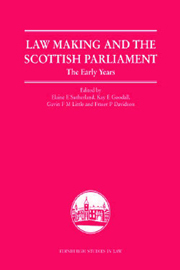Book contents
- Frontmatter
- Contents
- Preface
- List of Contributors
- Table of Cases
- Table of Westminster Statutes
- Table of Scottish Parliament Statutes
- Table of Westminster Statutory Instruments
- Table of Scottish Statutory Instruments
- THE SCOTTISH PARLIAMENT – ITS GENESIS AND OPERATION
- RIGHTS AND SOCIETY
- 3 Human Rights and People and Society
- 4 Child and Family Law: Progress and Pusillanimity
- 5 Culture
- 6 Charity Law: An Issue of Choice
- PUBLIC ADMINISTRATION AND SERVICES
- JUSTICE AND LEGAL SYSTEM
- ECONOMY AND ENVIRONMENT
- Index
5 - Culture
from RIGHTS AND SOCIETY
Published online by Cambridge University Press: 05 September 2013
- Frontmatter
- Contents
- Preface
- List of Contributors
- Table of Cases
- Table of Westminster Statutes
- Table of Scottish Parliament Statutes
- Table of Westminster Statutory Instruments
- Table of Scottish Statutory Instruments
- THE SCOTTISH PARLIAMENT – ITS GENESIS AND OPERATION
- RIGHTS AND SOCIETY
- 3 Human Rights and People and Society
- 4 Child and Family Law: Progress and Pusillanimity
- 5 Culture
- 6 Charity Law: An Issue of Choice
- PUBLIC ADMINISTRATION AND SERVICES
- JUSTICE AND LEGAL SYSTEM
- ECONOMY AND ENVIRONMENT
- Index
Summary
The Scottish Parliament generally has the competence to deal with most issues which would be considered to relate to culture, with the important exception of broadcasting. The creation of the Parliament has arguably resulted in greater discussion of a range of Scottish cultural issues than had been possible at Westminster, prior to devolution. There has, for example, been a committee with responsibility for culture since the creation of the Scottish Parliament, and it has produced a number of significant reports. These include a report in 2000 on an inquiry into the national arts companies; reports in 2001 on the Gaelic Broadcasting Committee and on Scottish Ballet; a report in 2003 on the role of education and cultural policy in supporting Gaelic, Scots and minority languages in Scotland; a 2004 report on broadband in Scotland; reports in 2005 on arts in the community and on the implications of BBC Scotland's internal reviews; and a 2008 report on the Creative Scotland Bill; as well as reports on the Gaelic Language (Scotland) Bills and on the Public Services Reform (Scotland) Bill, referred to below. The Scottish Government has a Minister for Culture and a division which deals with Arts and Culture; its annual budget for culture is currently approximately £201.9 million.
- Type
- Chapter
- Information
- Law Making and the Scottish ParliamentThe Early Years, pp. 84 - 102Publisher: Edinburgh University PressPrint publication year: 2011

